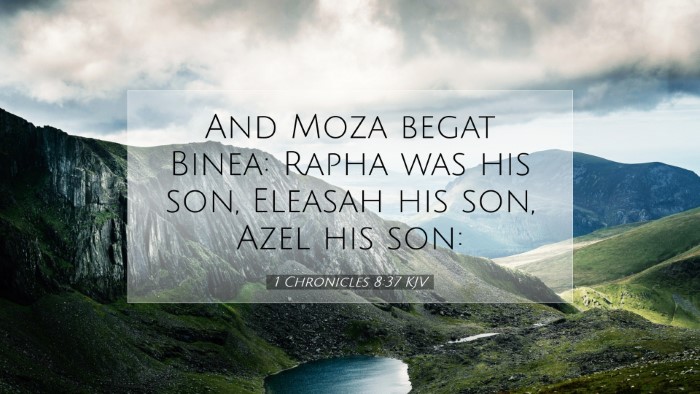Bible Commentary on 1 Chronicles 8:37
The verse from 1 Chronicles 8:37 states: "And the son of Jaroah was Jehoiakim." This brief statement may seem inconsequential at first glance, but it opens a profound discussion on the intricacies of genealogical records within Scripture, the significance of lineage, and God's sovereign plan as revealed through generations.
Genealogical Significance
Genealogies in the Bible serve multiple purposes. They affirm the fulfillment of God's promises and highlight the faithfulness of God through history. Biblical genealogies also establish the legitimacy of lineage, especially for the reign of kings, as seen prominently in the genealogies of Jesus (Matthew 1 and Luke 3).
Albert Barnes notes that the genealogical records were especially important for the Jewish people returning from exile, as they sought to reestablish their identity and heritage. This verse fits into that broader narrative, emphasizing that Jehoiakim's lineage connected to significant individuals in Judah's history, reflecting God's ongoing covenant with His people.
The Role of Jehoiakim
Jehoiakim, though his rule is often remembered for its shortcomings, provides crucial insights into the political and spiritual state of Israel during a tumultuous time. The historical context of Jehoiakim's reign, characterized by tension with Babylon and moral decline, invites deeper reflection on leadership and accountability.
In his commentary, Matthew Henry elucidates upon the themes of leadership inherent in this lineage. He points out that Jehoiakim, despite his flaws, was part of a larger redemptive story, showing that God can work through flawed leaders to bring about His purposes. This highlights a recurring theme in Scripture: God’s sovereignty and the effects of human failings.
Theological Implications
The mention of Jehoiakim in the genealogical line poses important theological discussions. Notable is the idea that God’s plans do not falter in the face of human sinfulness or disobedience. Adam Clarke emphasizes that God's intention is not thwarted by the actions of His people. Jehoiakim’s place in this lineage ultimately leads to the fulfillment of God's redemptive plan through Jesus Christ, who comes from a line that includes many imperfect kings.
Lessons for Faith and Ministry
For pastors and students of the Word, this genealogy speaks to the importance of understanding history in relation to salvation. It offers a reminder that every individual, regardless of their flaws or failures, is significant in God's tapestry of grace and purpose.
- Encouragement in Flaws: Just as Jehoiakim was used despite his poor choices, so too can individuals today be instruments for God's purposes.
- God’s Sovereignty: This verse reminds us that God orchestrates history in ways that often surpass human understanding.
- Identity in Christ: Christians can take comfort in knowing they are part of a lineage that extends to the heart of God's salvific plan, encouraging a sense of belonging and purpose.
Conclusion
1 Chronicles 8:37 encapsulates the important truth about God's work through history and the intricacies of His plan. The genealogical mention of Jehoiakim serves as a bridge connecting the Old Testament narrative to the New Testament's fulfillment in Christ. As we reflect on this passage, we are reminded that all lives and histories, regardless of their apparent chaos or disappointment, are woven into the larger narrative of God’s redeeming love.


